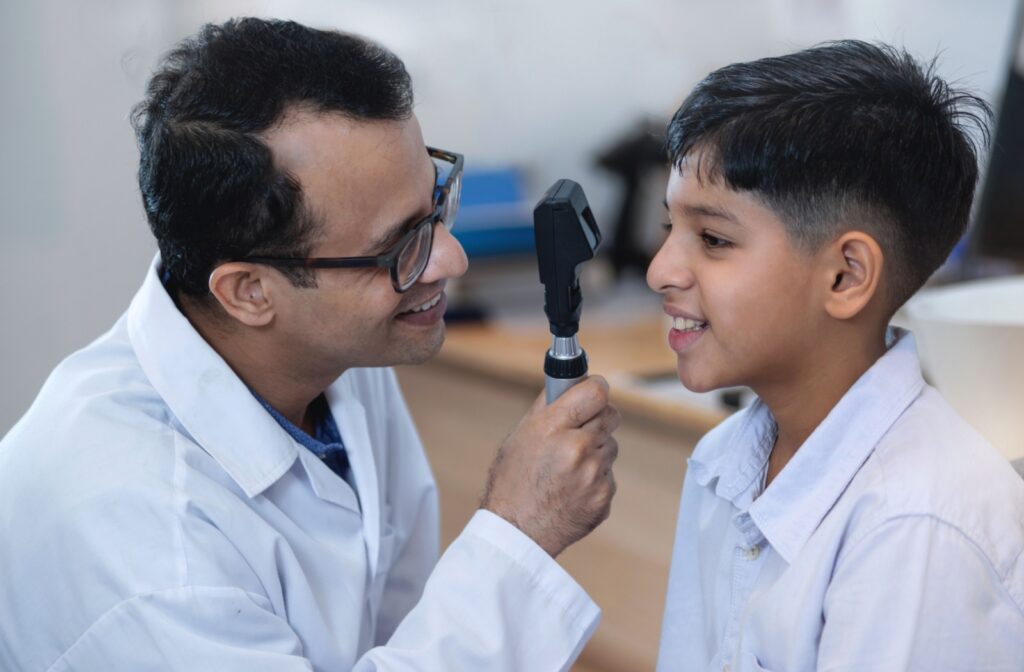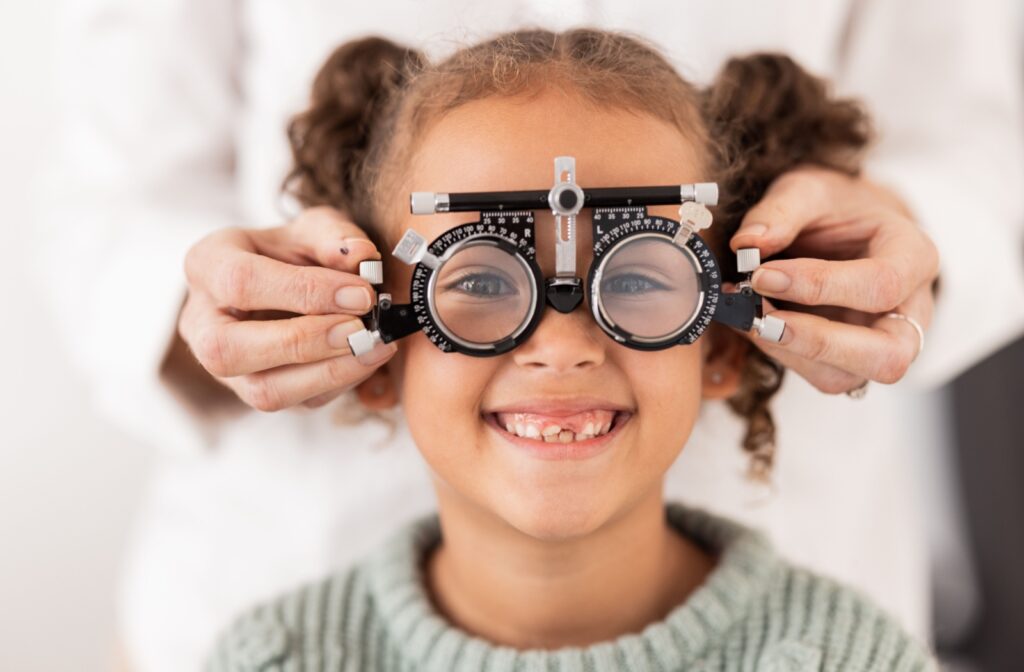Children’s eye health often receives less attention than it should, despite playing an essential role in their overall development. From learning in the classroom to participating in physical activities, clear vision helps children thrive across many areas of life.
Regular eye exams provide a wide range of benefits for kids, including:
- Early detection of vision problems
- Improved academic performance
- Protection against digital eye strain
- Monitoring of overall eye health
- Support for physical development
- Early signs of other health issues
- Increased confidence and self-esteem
- Lifelong eye care habits
Prioritizing eye exams in your child’s regular health routine helps protect their vision and overall well-being from an early age.
When Your Child Needs an Eye Exam
The Canadian Association of Optometrists recommends that children have their first comprehensive eye exam between 6 months of age. A follow-up exam should occur around the age of 3, then annually after that.
Watch for these warning signs that indicate your child may need an immediate eye health assessment:
- Frequent squinting or eye rubbing
- Complaints of headaches or eye strain
- Difficulty focusing on objects
- Covering one eye while reading
- Sitting too close to the TV or holding books very close
If you notice a white reflection in your child’s pupil in flash photography, seek immediate attention from an optometrist, as this can indicate a serious eye condition.
The 8 Benefits of Regular Eye Exams for Kids
- Early Detection Prevents Vision Problems
Many childhood vision issues develop gradually without obvious symptoms. Conditions like nearsightedness, farsightedness, and astigmatism can impact your child’s daily activities and academic performance.
Regular children’s eye exams allow optometrists to detect these problems before they become more serious. Early intervention with corrective lenses or other treatments can prevent complications and help your child maintain healthy vision as they grow.
- Supporting Academic Achievements
Research shows that 80% of classroom learning depends on vision. Children with undiagnosed vision problems may struggle with reading, writing, copying from the board, or focusing during lessons.
A comprehensive children’s eye exam ensures your child can see clearly in all learning environments. When vision problems are corrected early, children often show improvement in their academic performance and classroom engagement.
- Protecting Against Digital Eye Strain
Children are spending an increasing amount of time using tablets, computers, and smartphones for both education and entertainment. This increased screen time can lead to digital eye strain, causing symptoms like dry eye, headaches, and blurred vision.
During a children’s eye exam, optometrists assess signs of digital eye strain and provide practical strategies to protect young eyes. Simple techniques like the 20-20-20 rule (looking at something 20 feet away for 20 seconds every 20 minutes) can make a significant difference.

- Eye Health Monitoring
Children’s eye exams evaluate more than just vision clarity for glasses. Your optometrist examines the overall function and health of your child’s eyes, checking for conditions that could affect their long-term development. Your optometrist can detect conditions like amblyopia (lazy eye), strabismus (misaligned eyes), infections, and other issues like keratoconus, and even glaucoma and cataracts that require early treatment. The sooner these conditions are identified, the more effective treatment tends to be.
- Improvements in Physical Development
Good vision is essential for proper hand-eye coordination and motor skill development. Children with vision problems may struggle with activities like catching a ball, riding a bike, or participating in sports.
Regular eye health assessments detect if vision problems are interfering with your child’s physical development. Correcting vision issues early can improve their coordination and confidence in physical activities.
- Identifying Serious Health Issues
Eye exams can reveal signs of underlying health issues that extend beyond vision. Conditions like diabetes, high blood pressure, and even certain neurological disorders can sometimes be detected during a comprehensive eye examination.
This makes regular children’s eye exams an essential part of your child’s overall health monitoring. Early detection of these conditions through eye exams can lead to prompt medical intervention.
- Building Confidence & Self-Esteem
Children with undiagnosed vision problems often experience frustration and may develop behavioural issues as they struggle to see clearly. They might become withdrawn in social situations or reluctant to participate in activities.
Correcting vision problems through proper treatment can boost a child’s confidence. When children can see clearly, they’re more likely to be more engaged in school, sports, and social activities.
- Establishing Lifelong Eye Care Habits
Starting regular eye exams early teaches children that eye health is essential. This early introduction to eye care helps establish healthy habits that will serve them throughout their lives. Children who receive regular eye care are more likely to continue prioritizing their vision health as adults.
Protecting Your Child’s Vision Starts Now
Regular eye exams are one of the best ways to support your child’s long-term success. From learning in school to building confidence and coordination, clear vision impacts every part of their life.
At Whitby Family Eye Care, we offer a comfortable, child-friendly experience with thorough exams designed to catch problems early and protect your child’s developing vision. Don’t wait for vision problems to appear. Book your child’s eye exam online today and help set them up for healthy, clear vision.







